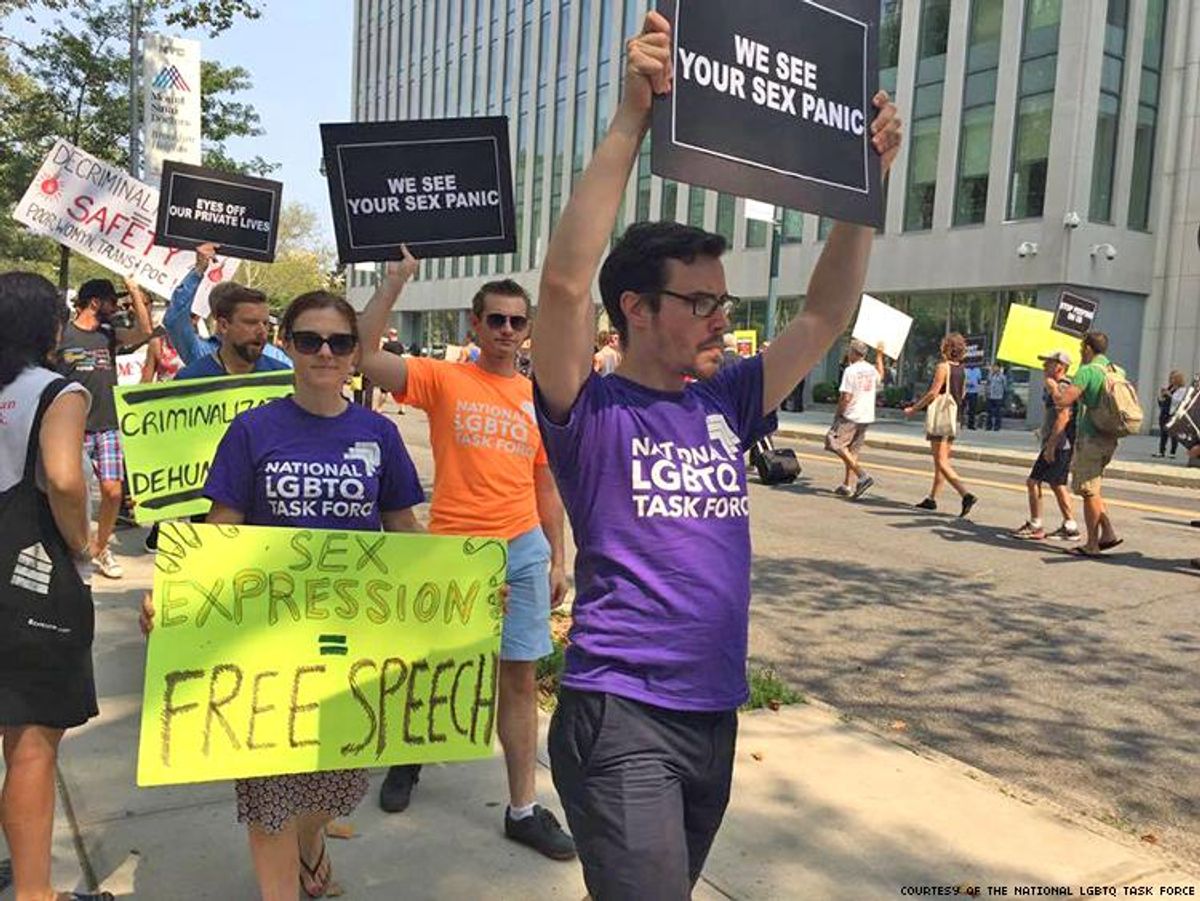Last year, the federal seizure of Rentboy, a gay advertising site for the adult industry, and the arrest of seven of its employees made headlines across the country. Thousands of men woke up one morning without their primary source of income and their personal information now in the hands of the Department of Homeland Security.
A broad coalition of LGBT organizations, from the National Center for Transgender Equality to the National Center for Lesbian Rights, called for the decriminalization of sex work, arguing that raids like that on Rentboy's New York headquarters threaten the safety of LGBT people engaged in sex work. Rallies throughout the country were organized, "know your rights" information distributed, and strong voices from the LGBT movement, sex workers and allies alike, declared that this was not justice but an abuse of power. After almost seven years advocating for the rights of those in the sex trade, it was inspiring for me to see so many LGBT leaders come out and declare that sex work was not a shame to keep hidden, but an issue in which we all have a stake.
Although criminal charges against the six employees arrested were dropped this week, the government doubled down on its commitment to prosecution last month, when it indicted Rentboy's CEO Jeffrey Hurant on criminal charges of "promoting prostitution" and "money laundering." These charges bring to mind nefarious criminal networks that victimize the helpless, but the indictment alleges something quite different. Many of the allegations of criminal activity refer to Rentboy's attempts to keep its advertisers -- the real, live human beings advertising their services on the site -- safe. In effect, it seeks to criminalize modern iterations of the very strategies that have kept marginalized LGBT people alive and safely navigating a hostile world for decades.
The indictment claims that Rentboy employees shared information with advertisers about what is legal and what is illegal when it comes to advertising adult services. It alleges that Rentboy shared information on local police raids and what kind of indentifying information a citizen can legally demand that a law enforcement agent provide, even if that officer is undercover. In sharing this kind of information, an employee allegedly told an advertiser "This is for your own safety," according to the indictment.
But information-sharing and community support is how LGBT folks have always kept each other safe. Whether we have offered tips on which teachers it was safe to come out to, where to find medical care that was competent without being invasive, or a couch to a friend who had hostile parents, our reliance on peer support has always been the backbone of our community. We have always looked to each other when seeking a path to navigate a world not built for us.
As a community organizer for people who trade sex, I can tell you that sharing information about the shifting legal landscape is a vital form of community support. At the Sex Workers Project, an organization that provides legal and social services to those in the sex trade, we get calls from people trying to understand legal definitions and rights, which are more complex than one might think. "Prostitution" has a different definition in every state. "Massage without a license" will get you a rap sheet, while it is legal to advertise for and provide "body work" without a license. As an organizer, providing information on how to screen potential clients for security purposes -- avoiding cops and violent clients alike -- was one of the most-requested workshops we offered. In a community that identifies law enforcement as one of the worst perpetrators of violence, this information can literally save lives.
But if this kind of information-sharing is criminalized as "promoting prostitution," even peers and service organizations will be reluctant to do it. Already, reasonable and proven harm-reduction tactics are being criminalized: telling someone which client recently robbed another worker, letting someone use your phone to type out an ad because his service was cut off, using your credit card to pay for a room so your friend doesn't have to work on the street. At the Sex Workers Project we get calls from those in the sex trade who carry "promoting" charges for this exact kind of peer support. The Rentboy raid elevates the level of fear we face when we are just trying to keeping our peers and community safe from harm.
Organizations and advocates who serve marginalized communities have always had to engage in harm reduction around criminalization. Keeping each other safe from law enforcement has always been essential for the LGBT community, especially because we know what happens to our community when we are incarcerated. Regardless of how someone may feel about the sex industry, the harms of criminalization for our community, our friends, and often our family members (chosen and otherwise) are not up for debate. Criminalizing harm reduction creates more harm.
Rentboy was more than a place to advertise, it was a place that was thoughtful to the needs of men in the adult industry. It provided health and safety information, and pushed back on stigma and shame that silences many in the adult industry, even hosting a college fund. Closing Rentboy took away a resource for thousands of men who make ends meet in the adult industry. But prosecuting Rentboy's CEO with "promotion of prostitution" for sharing legal and safety information undermines our collective ability to protect ourselves -- and each other.
 KATE D'ADAMO is the national policy advocate at the Sex Workers Project at the Urban Justice Center, working on policy and social advocacy at the state, federal and cross-regional level on issues impacting those engaged in the sex trade, including human trafficking and HIV. Prior to joining SWP, Kate was the lead organizer with the Sex Workers Outreach Project-NYC and Sex Workers Action New York, two constituent-led organizations supporting those trading sex in the New York City area.
KATE D'ADAMO is the national policy advocate at the Sex Workers Project at the Urban Justice Center, working on policy and social advocacy at the state, federal and cross-regional level on issues impacting those engaged in the sex trade, including human trafficking and HIV. Prior to joining SWP, Kate was the lead organizer with the Sex Workers Outreach Project-NYC and Sex Workers Action New York, two constituent-led organizations supporting those trading sex in the New York City area.


 KATE D'ADAMO is the national policy advocate at the Sex Workers Project at the Urban Justice Center, working on policy and social advocacy at the state, federal and cross-regional level on issues impacting those engaged in the sex trade, including human trafficking and HIV. Prior to joining SWP, Kate was the lead organizer with the Sex Workers Outreach Project-NYC and Sex Workers Action New York, two constituent-led organizations supporting those trading sex in the New York City area.
KATE D'ADAMO is the national policy advocate at the Sex Workers Project at the Urban Justice Center, working on policy and social advocacy at the state, federal and cross-regional level on issues impacting those engaged in the sex trade, including human trafficking and HIV. Prior to joining SWP, Kate was the lead organizer with the Sex Workers Outreach Project-NYC and Sex Workers Action New York, two constituent-led organizations supporting those trading sex in the New York City area.














































































Viral post saying Republicans 'have two daddies now' has MAGA hot and bothered